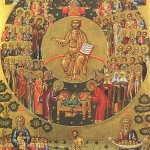Today, a new column debuts in the Catholic Portal with award-winning writer Kathy Coffey’s Catholic Being — and nothing could be better-timed, I think, than her excellent exposition on how the pathway to prayer can be accessed by stress:
If we think of prayer as long, uninterrupted stretches in a quiet church or retreat house, we might get more stressed out worrying that we’ll never achieve that. Instead, we might want to think of prayer in terms of the different voices heard in John 11:1-44.
It’s definitely a stressful situation. Lazarus, the beloved brother of Martha and Mary has just died. Making matters worse, Jesus has delayed coming, even though he knew Lazarus was ill. His disciples are annoyed with him for returning to an area where the Jews were just trying to stone him. Emotions must be running high, but various forms of prayer appear during the crisis.
Lazarus, Mary, Martha and Jesus all love each other—so the sisters must wonder why Jesus waited so long to come. We can only imagine their anxiety increasing as Lazarus grew worse, and their dear friend didn’t appear. Martha’s complaint, “Lord, if you had been here, my brother would not have died” may sound like whining. On the other hand, it is honest expression of her feelings—and her respect for Jesus.
Later, Mary weeps; her friends join her, and Jesus also weeps. This could be our prayer when we have no words left, and silent tears are eloquent. Jesus is “greatly disturbed,” but begins his prayer by thanking God. Despite the annoying criticism of the crowd (“Could not he who opened the eyes of the blind man have kept this man from dying?”), he can still be grateful. In that stance lies a message for us—no matter how stressed we are, we can still be deeply thankful.
Jesus speaks with great confidence to God: “Father…I knew that you always hear me.” Then from the depth of his inmost being tears the wrenching cry, “Lazarus, come out!” It is the call to life, a stirring invitation to renewed engagement with the family Lazarus loves.
None of this occurs in a silent chapel. Indeed, the background noise of the crowd must be irritating. Prayer doesn’t always convey the polite emotions. Martha’s distress is as raw as the anger which rages through some of the psalms (see Ps. 88, 120, 137). No one consults a Bible or a book of prayer—all of it is spontaneous; some of it is wordless.
This is one of those pieces you might want to print out for bedtime reading or coffee-on-the-porch reading (or, you know, Coffey-on-the-porch…yeah, you get it!) If you’re finding yourself too frazzled, too stressed, too busy to pray, this might be exactly the gentle nudge you need.
Oh, and be sure to stop by and welcome Kathy to the pages! As my Auntie Lillie would say, “she’s got a nice face, ain’t she?” 











